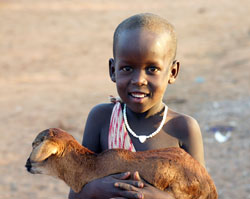Situations, emotions come to forefront during 10-day journey to Africa

An African boy holding his goat stops to get his picture taken. (Photo by David Siler)
By John Shaughnessy
During his recent 10-day journey to Africa, David Siler experienced a range of different situations and emotional reactions—from eating goat at meals to adjusting to not having access to e-mail and a cell phone.
Here, the executive director of Catholic Charities and Family Ministries for the archdiocese talks about those experiences during his time of touring projects in Africa that were implemented by Catholic Relief Services—the international humanitarian agency of the Catholic Church in the United States:
Culture shock in Africa: “There’s a culture shock going there, and a culture shock coming back. In both Ethiopia and Tanzania, the people, for the most part, live very primitive lives, probably like they lived hundreds of years ago—scratching out an existence through subsistence farming. Their homes are made out of sticks and mud. In some ways, it’s hard to relate. The greatest poverty we saw over and over again had to do with the scarcity of water.”
Culture shock in returning to America: “I’d be in conversation with people, and they’d be complaining about things that seemed so hollow in comparison to people trying to exist. Here, people are complaining about the weather and their luxury car. In the capital city of Ethiopia, the largest grocery store had four aisles. Here, our grocery stores have four aisles of cereal. It just makes you realize how many choices we have for everything.”
The taste of goat: “We ate a fair amount of goat. It’s the most eaten animal in the world. It’s not too dissimilar from beef. And they use a lot of sauces.”
The pride that comes with a purpose: “With each water project that it does, Catholic Relief Services wants the local people to take ownership of the project. In one village, I met the man who was in charge of security for the well. He spoke with such pride that he was in charge of security for the well. To him, that was his purpose.”
Freedom from electronic connection: “My phone didn’t work there, and I didn’t have access to e-mail. So there weren’t as many distractions. It was very freeing. I had a feeling of jealousy—that the way that people spent their time was with their family. The villages were close-knit, the families were together. Here, we may not know our neighbors or our families are far away. There, you would ask them about their family, and they would talk about the whole village. We’ve gotten so far away from that in our country.” †
(Related story: Journey helps director see how Catholics in America are helping people in Africa)
